Produced and Directed by Bill Hanna and Joe Barbera.
Credits: Animation – Hicks Lokey, Layout – Tony Rivera, Backgrounds – Dick Thomas, Written by Mike Maltese, Story Director – Alex Lovy, Titles – Art Goble, Production Supervision – Howard Hanson.
Voice Cast: Yakky Doodle – Jimmy Weldon; Mother Kangaroo – Jean Vander Pyl; Hoppity, Hunter, Shark – Daws Butler. Music: Hoyt Curtin.
Copyright 1961 by Hanna-Barbera Productions.
Plot: Yakky and Hoppity become “brothers” against objections of the kangaroo’s mother.
One wonders if the Yakky Doodle series was originally intended for the orphaned duck to go hither and yon to ingratiate himself into homes where he wasn’t wanted. There are a number of cartoons in the series where the duck is told to get lost and he doesn’t seem to comprehend the concept that “no means no.”
If that’s the case, I suspect Mike Maltese or Joe Barbera realised that it would be better for some kind of regular setting was imposed on the series to strengthen it. This enabled Maltese to work out some character relationships that would appeal to audiences who might easily tire of a “poor-little-me” duckling act every week.
However, we’re not quite there. This episode, improbably, has Yakky (who is too weak to fly in other cartoons) flapping his way across the Pacific to Australia where he decides to move in with a kangaroo mother and son. Yakky, as usual, is enthusiastic but pretty ignorant. He sees an ocean liner and thinks he’s over a “little bitty lake.” He thinks a jet is a bird that will give him a lift (it doesn’t). He thinks a shark trying to eat him is a big fish. He thinks Australia is Missouri, engaging in the old cartoon gag of incompetently misreading a sign.
![]()
![]()
![]()
![]()
The best bit comes close to the start of the cartoon. The shark follows Yakky onto the land. The two skid to a stop. “Hey, fish aren’t supposed to be out of water,” Yakky points out. “Say, you’re right!” says the “fish.” “Thanks, pal.” And with that the shark turns around and zooms out of the scene and the cartoon.
The rest of the cartoon is pretty straight-forward. He and a kid kangaroo decide to be brothers. The mama kangaroo isn’t impressed and tells Yakky to go fly somewhere. But the duck refuses to accept that he’s an unwanted pain in the pouch. “I’ll bet she’d be my mama if I really asked her to,” he decides. He knocks on her door. “Hello, mama! Food. Food. I’m about to starve. Uh, where do I sleep?” Yeah, the duck simply invites himself in and expects a free meal. The mother kicks him out and slams the door. Cut to a scene outside. Somehow, the son Hoppity is now behind a stump where he declares to Yakky he’s decided to run away from home. If they were going for some pathos here, it’s completely undercut by the Flintstones bassoon music tooting away in the background.
The remainder of the cartoon plot is an old and hoary one—the little pathetic creatures rises up to vanquish an opponent and win everyone’s friendship in the end. Yakky saves Hoppity from a hunter (who has boomerangs in a golf bag like a set of clubs) that wants to turn him into a pair of gloves, somehow being dexterous enough to toss boomerangs down on the fleeing hunter, and then pulling the drowning kangaroo out of the water (after telling him to go in the water). Mother, son and new brother hop away together, stage right, to end the cartoon.
![]()
![]()
![]()
![]()
![]()
![]()
Jean Vander Pyl and Daws Butler don’t even attempt Australian accents on the kangaroos. The mother sounds like Ma Rugg in the Hillybilly Bears cartoons except with less of a drawl, while Daws’ boy kangaroo sounds a lot like Blabber Mouse. Australian accents seemed to elude Daws; the hunter sounds closer to some kind of Englishman.
The most satisfying moment was when Yakky, hopping like a kangaroo, crashes into a stump. Dick Thomas once again has small, colourful flowers adorning the scenery.
By the way, the shark sounds like Fibber Fox, who hasn’t been invented yet.
Credits: Animation – Hicks Lokey, Layout – Tony Rivera, Backgrounds – Dick Thomas, Written by Mike Maltese, Story Director – Alex Lovy, Titles – Art Goble, Production Supervision – Howard Hanson.
Voice Cast: Yakky Doodle – Jimmy Weldon; Mother Kangaroo – Jean Vander Pyl; Hoppity, Hunter, Shark – Daws Butler. Music: Hoyt Curtin.
Copyright 1961 by Hanna-Barbera Productions.
Plot: Yakky and Hoppity become “brothers” against objections of the kangaroo’s mother.
One wonders if the Yakky Doodle series was originally intended for the orphaned duck to go hither and yon to ingratiate himself into homes where he wasn’t wanted. There are a number of cartoons in the series where the duck is told to get lost and he doesn’t seem to comprehend the concept that “no means no.”
If that’s the case, I suspect Mike Maltese or Joe Barbera realised that it would be better for some kind of regular setting was imposed on the series to strengthen it. This enabled Maltese to work out some character relationships that would appeal to audiences who might easily tire of a “poor-little-me” duckling act every week.
However, we’re not quite there. This episode, improbably, has Yakky (who is too weak to fly in other cartoons) flapping his way across the Pacific to Australia where he decides to move in with a kangaroo mother and son. Yakky, as usual, is enthusiastic but pretty ignorant. He sees an ocean liner and thinks he’s over a “little bitty lake.” He thinks a jet is a bird that will give him a lift (it doesn’t). He thinks a shark trying to eat him is a big fish. He thinks Australia is Missouri, engaging in the old cartoon gag of incompetently misreading a sign.
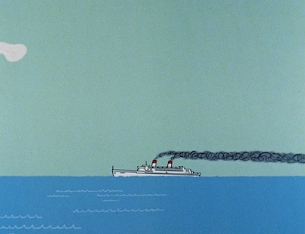
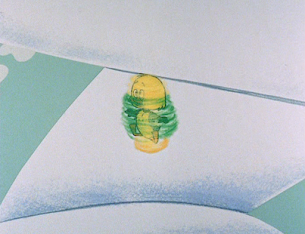
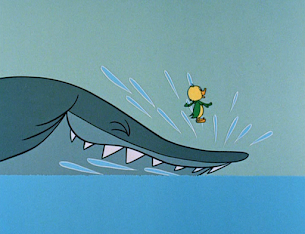
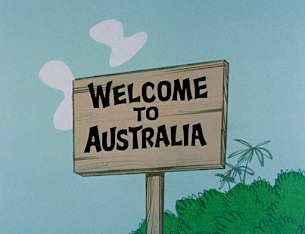
The best bit comes close to the start of the cartoon. The shark follows Yakky onto the land. The two skid to a stop. “Hey, fish aren’t supposed to be out of water,” Yakky points out. “Say, you’re right!” says the “fish.” “Thanks, pal.” And with that the shark turns around and zooms out of the scene and the cartoon.
The rest of the cartoon is pretty straight-forward. He and a kid kangaroo decide to be brothers. The mama kangaroo isn’t impressed and tells Yakky to go fly somewhere. But the duck refuses to accept that he’s an unwanted pain in the pouch. “I’ll bet she’d be my mama if I really asked her to,” he decides. He knocks on her door. “Hello, mama! Food. Food. I’m about to starve. Uh, where do I sleep?” Yeah, the duck simply invites himself in and expects a free meal. The mother kicks him out and slams the door. Cut to a scene outside. Somehow, the son Hoppity is now behind a stump where he declares to Yakky he’s decided to run away from home. If they were going for some pathos here, it’s completely undercut by the Flintstones bassoon music tooting away in the background.
The remainder of the cartoon plot is an old and hoary one—the little pathetic creatures rises up to vanquish an opponent and win everyone’s friendship in the end. Yakky saves Hoppity from a hunter (who has boomerangs in a golf bag like a set of clubs) that wants to turn him into a pair of gloves, somehow being dexterous enough to toss boomerangs down on the fleeing hunter, and then pulling the drowning kangaroo out of the water (after telling him to go in the water). Mother, son and new brother hop away together, stage right, to end the cartoon.
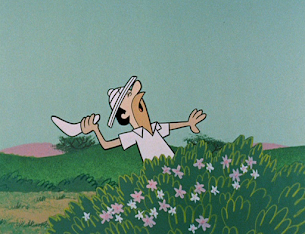
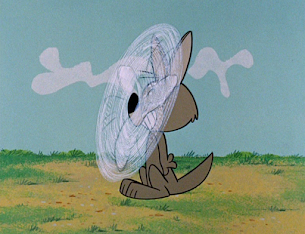

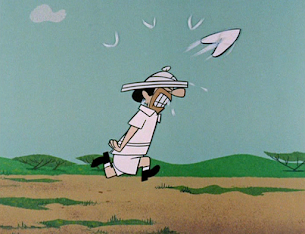

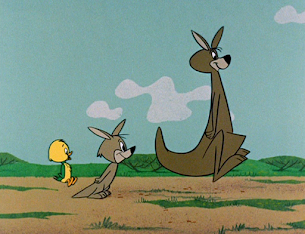
Jean Vander Pyl and Daws Butler don’t even attempt Australian accents on the kangaroos. The mother sounds like Ma Rugg in the Hillybilly Bears cartoons except with less of a drawl, while Daws’ boy kangaroo sounds a lot like Blabber Mouse. Australian accents seemed to elude Daws; the hunter sounds closer to some kind of Englishman.
The most satisfying moment was when Yakky, hopping like a kangaroo, crashes into a stump. Dick Thomas once again has small, colourful flowers adorning the scenery.
By the way, the shark sounds like Fibber Fox, who hasn’t been invented yet.



